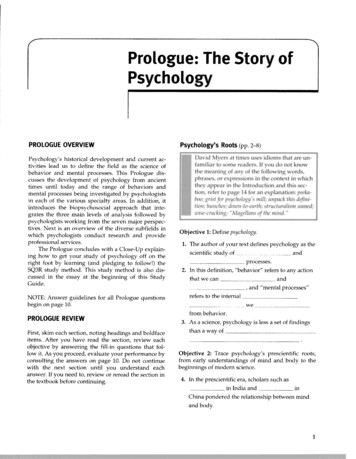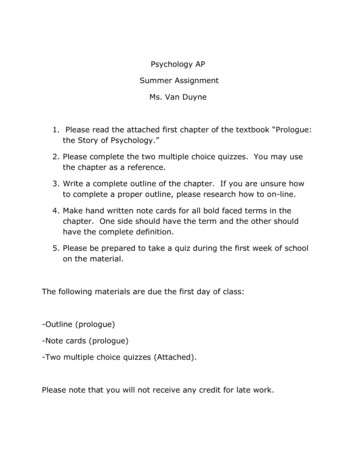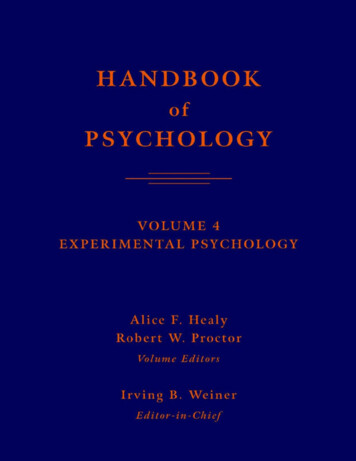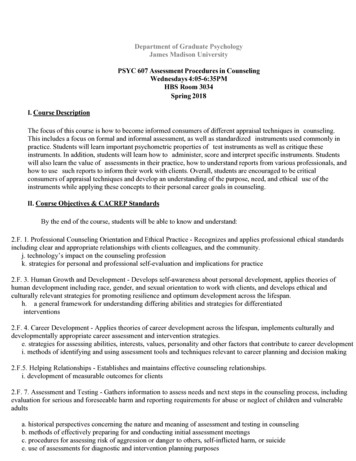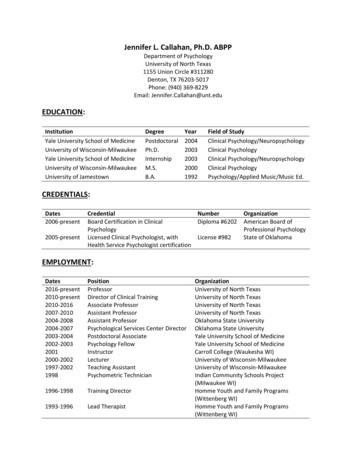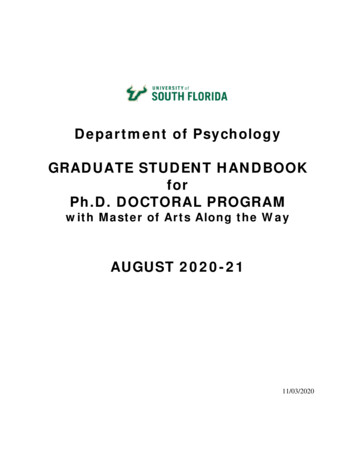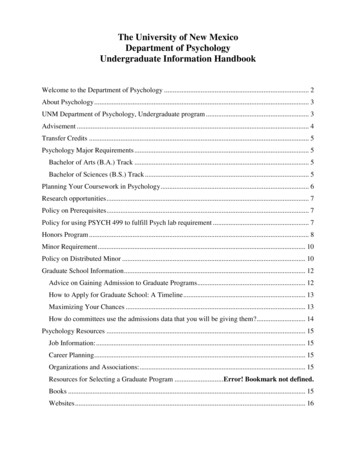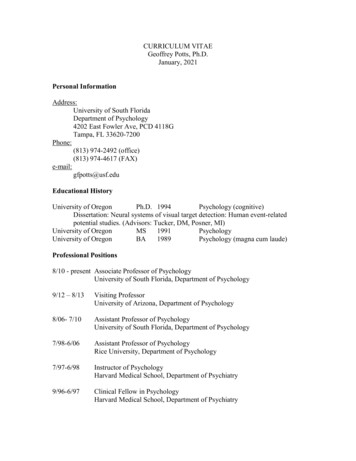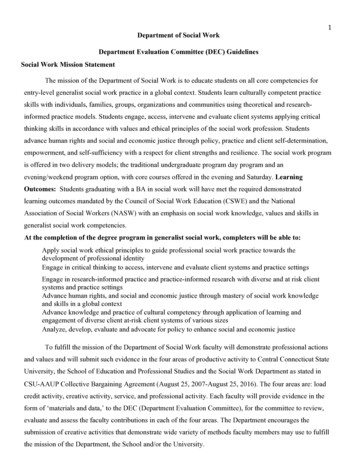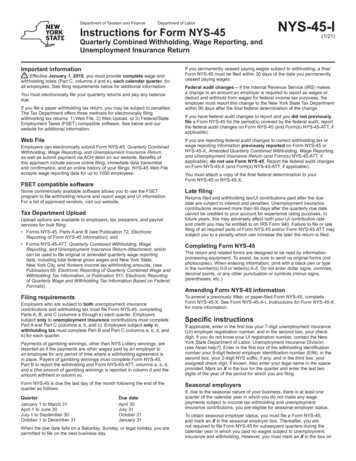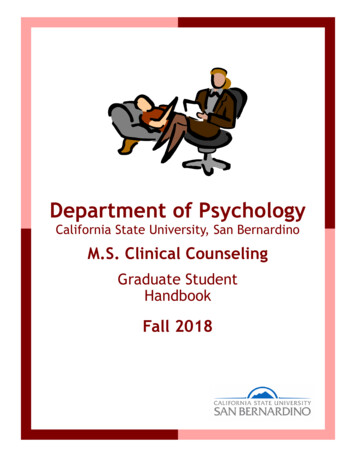
Transcription
Department of PsychologyCalifornia State University, San BernardinoM.S. Clinical CounselingGraduate StudentHandbookFall 2018
Department of PsychologyCalifornia State University San BernardinoSECTION ONELetter From The Department Chair. . . . .2Letter From The Clinical Director. . . . .3MSCC First Year Students. . . . .4Two Year Schedule. . . . .5M.S. Degree Requirements. . . . .6MFT Licensure Requirements. . . . .7Grade Requirements. . . . .11Classified Status. . . . .11Writing Requirement for Graduate Candidacy. . . . .11Advancement to Candidacy . . . . .12Culminating Experience. . . . .13Comprehensive Exam . . . . .13Thesis. . . . .14Graduation Requirement Check. . . . .17Other Important Information. . . . .17Leave of Absence. . . . .18Responsibilities of Faculty Members. . . . .19Responsibilities of Students. . . . .20Professional Memberships. . . . .20Colloquia. . . . .21Ethical Requirements. . . . .22Plagiarism . . . . .23Research Involving Human Subjects. . . . .24Graduate Student Teaching Positions. . . . .27Financial Aid28Research and Travel Funding29Applying to Doctoral Programs . . . .29Psychology Faculty Research Interests. . . . .30SECTION TWO - FORMSAdmission Deferral/Leave of Absence .IAdvancement To Candidacy—Comp. Exam Option .IIAdvancement To Candidacy—Thesis Option .IIIApplication for Classified StatusIVChange in Study Plan .VOral Defense Information Form .VIPetition for Acceptance of Graduate Work .VIIPetition for Waiver of University Regulations .VIIIThesis Proposal Acceptance Form .IXPage 1
Department of Psychology5500 University ParkwaySan Bernardino, CA 92407-2397Phone: (909) 537-5570Fax: (909) 537-7003Fall 2018Dear Psychology Graduate Student:It is my sincere pleasure, on behalf of the faculty and staff, to welcome you to the Departmentof Psychology.Your graduate education will include many challenging and rewarding educational experiencesand opportunities. You will receive state-of-the-art instruction, supervision and professionaltraining from our outstanding faculty. You can count on our devoted staff to provide timelyanswers to your questions and valuable assistance in navigating the regulations that govern thegraduate program. In turn, you will be asked to devote the time and energy necessary to besuccessful, and to fulfill your academic promise by embracing the pedagogical challenges andopportunities to be found inside and outside the classroom. You will also be asked to representthe department on and off campus responsibly and professionally, with a spirit of collegialityand cooperation.We invite our graduate students to participate in and to contribute to the intellectual atmospherein the department. Hence, we encourage you to join our department’s clubs and organizations,attend scheduled department social events and scholarly presentations, and initiate activitiesthat you and other members of our community will find rewarding.My office door will always be open. I encourage you to come by if you have any questionsabout our program, or if you want to share with me your positive experiences or your concerns.On behalf of the department’s faculty and staff I offer my very best wishes for an outstandingcareer in our graduate program.Sincerely,Robert Ricco, Ph.D.Professor and ChairPage 2
Department of Psychology5500 University ParkwaySan Bernardino, CA 92407-2397Phone: (909) 537-5570Fax: (909) 537-7003Fall 2018New Clinical Counseling Graduate Students,Welcome to the 2018-19 academic year. This orientation packet has important informationregarding the MS curriculum and MFT licensure requirements. Please note that you have beenadmitted to this program that meets the current curriculum and licensure requirements that wentinto effect August 2012. These changes have been set into motion by the Board of BehavioralSciences in order to facilitate employment opportunities for MFT’s in California. I encourageyou to stay current with your field. The website for the Board is www.bbs.ca.gov. We alsorecommend student membership in the California Association of Marriage and FamilyTherapists (CAMFT) where you will be updated on most things current and significant in yourfield. (website: www.camft.org)Welcome. We look forward to working with you.Sincerely,David Chavez, MS Clinical Counseling Program CoordinatorThe Clinical/Counseling FacultyManijeh Badiee, MS Clinical Counseling Faculty MemberStacy Forcino, MS Clinical Counseling Faculty MemberChristina Hassija, Community Counseling Center DirectorJacob Jones, MS Clinical Counseling Faculty MemberMichael Lewin, MS Clinical Counseling Faculty MemberMaria Santos, MS Clinical Counseling Faculty MemberPage 3
M S C C F i r s t Ye a r S t u d e n t s 2 0 1 8 / 1 9Cesar Agudo (DePaul University)Mayra Barragan (CSUSB)Julelisa Beltran (CSUSB)Kaela Bonafede (CSUSB)Norma Fernandez (CSUSB)D’Andra Johnson (CSUSB)Gabrielle Lautfy (CSUSB)Cecilia Melendez (CSUSB)Elizabeth Rahmani (CSULB)Leslie Smith (CSU, Bakersfield)Yesica Valenton (CSUSB)Destanie Vanderwalker (CSUSB)Page 4
Tw o Ye a r S c h e d u l eMaster of Science in Clinical Counseling (MSCC) Course ScheduleComprehensiveExam OptionThesisOption90 Units91-92 UnitsTCPSYC-611, PSYC-612PSYC-611: Advanced Independent Study (5)PSYC-612: Directed Reading (5)First Year (2018-2019)Second Year C-612PSYC-612CTPSYC-616PSYC-616: Child & Spousal/Partner Abuse (4)CTPSYC-618PSYC-618: Community and Public Mental Health (4)CTPSYC-619PSYC-619: Community Disaster, Trauma, and Resilience (4)CTPSYC-633PSYC-633: Professional Ethics and Law (4)CTPSYC-636PSYC-636: Cross-Cultural Counseling (4)CTPSYC-638PSYC-638: Substance Abuse: Detection, Assessment, & Treatment (4)CTPSYC-640PSYC-640: Advanced Methods in Psychological Research (4)TPSYC-642PSYC-642: Regression and Nonparametric Statistics (4)PSYC-642CTPSYC-654PSYC-654: Advanced Life-Span Developmental Psychology (4)PSYC-654CTCTPSYC-665PSYC-665: Psychopathology 8PSYC-640PSYC-665PSYC-667PSYC-667PSYC-667: Family Processes (4)CTPSYC-671, PSYC-672, PSYC-673PSYC-671: Marriage and Family Therapy Skills I (5)PSYC-672: Marriage and Family Therapy Skills II (5)PSYC-673: Marriage and Family Therapy Skills III (5)CTPSYC-679PSYC-679: Theories of Counseling & Psychotherapy (4)CTPSYC-682PSYC-682: Clinical Assessment (4)CTPSYC-687A, PSYC-687B, PSYC-687CPSYC-687A: Marriage and Family Therapy Practicum I (2)PSYC-687B: Marriage and Family Therapy Practicum II (2)PSYC-687C: Marriage and Family Therapy Practicum III (2)CTPSYC-688PSYC-688: Evidence Based Practice in Marriage and Family Therapy (4)PSYC-688TPSYC-697A, PSYC-697B, PSYC-697CPSYC-697A: Advanced Practicum in Counseling Psychology I (4)PSYC-697B: Advanced Practicum in Counseling Psychology II (4)PSYC-697C: Advanced Practicum in Counseling Psychology III ives8 units of electives to be chosen from 500- or 600-level courses, excludingPSYC-575, 611and 612CPSYC-999APSYC-999A: Comprehensive ExaminationPSYC-630PSYC-630: Teaching of Psychology (2) [*required for teaching]PSYC-999APSYC-630PSYC-630PSYC-611, PSYC-612, PSYC-699 will be offered every quarter and PSYC-999A [C] will be offered during the Spring Quarter.MSCC second-year students are recommended to take PSYC-611E during the Fall Quarter and PSYC-699 during the Spring Quarter.MSCC “Comprehensive Exam Option” students are recommended to take PSYC-612E during the Winter Quarter and PSYC-999A during the Spring Quarter.Consult your Advisor or Program Director for questions regarding recommended course options.Page 5PSYC-630PSYC-630
M.S. Degree RequirementsThe M.S. degree requires completion of 92 units (Thesis Option) or 90 units(Comprehensive Exam Option) of coursework with a GPA of at least 3.0. You cannotcredit any course with a grade of C- or lower toward the M.S. degree. Also, inaccordance with University regulations, no more than 12 units of credit earned inunclassified standing may be counted toward the M.S. degree.Based on licensing requirements, most of the units are proscribed, meaning you havefew decisions to make about what courses to take. How many units to take depends, ofcourse, on your energy and available time. Twelve units constitute full-time status forgraduate students; however, our students typically take an additional 2 to 4 units perquarter. You may register for up to 16 units per quarter. Registering for more than 16units is considered an overload and cannot be accomplished via the priorityregistration procedure. See the department staff for procedures.First-year coursework should include 618 (Community and Public Mental Health),Psychology 633 (Professional Ethics and Law), 640 (Advanced Methods inPsychological Research), 665 (Psychopathology), 667 (Family Processes), 671/672/673(Marriage & Family Therapy Skills), 679 (Psychotherapy Theories), and Psychology687A, B, C (Marriage & Family Therapy Practicum). In addition, those planning to teachshould also take Psychology 630 (Teaching of Psychology).Second-year coursework should include 616 (Child and Spousal/Partner Abuse), 619(Community Disaster, Trauma and Resilience), Psychology 641 (Analysis of Variance)or Psychology 642 (Multiple Regression), (for thesis option), 636 (Cross-Cultural), 638(Substance Abuse) 654 (Advanced Life Span Developmental Psychology), 682 (ClinicalAssessment), Psychology 688 (Evidence Based Practice in MFT), and 697A, B, and C(Advanced Practicum in Counseling Psychology).Page 6
MFT Licensure RequirementsFor information regarding the current MFT licensure requirements, refer to the Lawsand Regulations Relating to the practice of Marriage, Family and Child Counselingissued by the California Board of Behavioral Sciences. This document explains how toobtain your counseling requirements for the MFT license. MFT Licensure requirementsare frequently updated so you are advised to obtain a copy of the Laws andregulations document yearly. You can obtain a copy, by writing or calling:Board of Behavioral Sciences400 R Street, Suite 3150Sacramento, CA 95814-6240(916) 445-4933You may also download the document from http://bbs.ca.gov/pdf/publications/lawsregs.pdf. Additionally you may discuss questions regarding MFT Licensurerequirements with faculty. You will need to start tracking your hours as soon as youhave completed more than 2 quarters of graduate training in our program. On thenext page are copies of the forms that you will need to complete for the trackingprocess.Because the Board of Behavioral Sciences sometimes questions the nature and contentof course titles that appear on student transcripts, you are strongly urged to retain allyour course syllabi as your record of what was covered in specific courses. In addition,doctoral programs frequently request a course syllabus before they will approve acourse in conjunction with an applicant's request for advanced standing.Another good way to “stay on top” of the MFT profession and licensing requirements isto become a member of CAMFT. You can download membership forms andprofessional liability insurance applications from the CAMFT website, www.camft.org.Exit SurveyIn order to improve and enhance our program on an ongoing basis, it is essential thatwe receive feedback from our graduates regarding their experiences as a student inour program. Program certification required by the BBS will be mailed out to graduatesonce degree has posted and exit survey has been received.Page 7
M F T Tr a c k i n g F o r m sPage 8
M F T Tr a c k i n g F o r m s ( C o n t . )Page 9
M F T Tr a c k i n g F o r m s ( C o n t . )Page 10
Grade RequirementsAn overall GPA of 3.0 is required. If your overall GPA falls below a 3.0, automaticprobation will occur. Raising the GPA to a 3.0 must occur in the quarter followingprobation, otherwise you will be declassified from the program.Clinical counseling students are also required to achieve grades of "C" (2.0) or better inall courses in the program.Only one course in the graduate program can be repeated for a better grade. Youmust petition the psychology department for authorization to retake one course. Inaddition, you must file a petition to repeat a course with Graduate Studies.Classified StatusIf a student was Conditionally Accepted into the program and has completed theconditions of classification based on their Graduate Decision Form, they may fill out anapplication for Classified Status. The student and the director must sign a form and theconditions of your acceptance must be verified by the Psychology Department.Students must be classified before they will be allowed to advance to candidacy. Toapply for Classified Status contact the MSCC program director for the appropriatepaperwork.Writing Requirement for Graduate CandidacyGraduate students will be required to have passed a Writing Requirement for GraduateCandidacy (WRGC) before advancing to candidacy within a graduate program. TheWRGC requirement can be satisfied through one of two options:1. Completion of PSYC-640 (Advanced Methods in Psychological Research) with agrade of B- or better.2. Demonstration of professional writing via a petition to Graduate Studies.Page 11
Advancement to CandidacyAfter completing at least 16 units of graduate coursework and successfully completingthe upper division writing requirement you can formally request Advancement toCandidacy. However, we generally will not sign off until the fall quarter of your 2ndyear. You should have a thesis or comprehensive exam advisor when advancing;however, it is not necessary to have selected your entire thesis committee.When you apply for advancement to candidacy, your performance in the program willbe evaluated by the program director in consultation with your advisor and clinicalcounseling faculty. In addition, reports from your traineeship will be taken intoconsideration. If your performance is deemed satisfactory, you will be advanced. Ifyour performance is unsatisfactory, you may be declassified from the program.a. If there are any courses you have taken as an unclassified graduate studentor transfer student that you want to be counted toward your degree, be sureto file the Petition for Acceptance of Coursework form in the departmentoffice.b. If you change your advisor, committee members, or your program of studyafter you have advanced to candidacy, you must file a Change in Study Planform in the department office.To be formally advanced to candidacy, a student must, to the satisfaction of theprogram coordinator, have:1. achieved classified status;2. successfully completed 16 units of coursework in the program andmaintained a 3.0 (‘B’) GPA in the coursework;3. selected a graduate advisor to supervise the course of study;4. satisfactorily completed the writing requirement;5. be deemed to have engaged in ethical and professional conduct with regardto clients, classmates, and faculty as reported by faculty and supervisors;6. filed an approved Advancement to Candidacy form, which is downloadablefrom the department website (http://psychology.csusb.edu/).Page 12
Culminating ExperienceOne of your most important decisions will be WHICH OPTION TO CHOOSE forcompleting the program: thesis or comprehensive exam. The best decision for you willdepend on your interests, future educational objectives, available time, and careerorientation. Consultation with faculty regarding this decision is strongly recommended.Written information on both options is available in the Department Office. A THESISMANUAL explains all phases of completing a Master's thesis. Information on theComprehensive Exam, administered in Spring quarter, includes advice on exampreparation.Your decision about which option to select for your degree should be made no laterthan the beginning of your second year of study, and preferably by the end of yourfirst year. Students selecting the thesis option usually use the summer after their firstyear to complete the thesis proposal; comprehensive exam students often begin theirreading during the summer months also.Comprehensive ExamComprehensive Examination Preparation & CompletionEnroll in PSYC 612E (5 Units). This course is designed to help you prepare for thecomprehensive exam and should be supervised by the Comprehensive ExamCoordinator. This course should be taken the spring quarter of your second year in theprogram. It is taken simultaneously with Psyc 999A (Comprehensive Exam). Thus,while preparation for the comprehensive exam begins prior to spring of your secondyear, credit for it is given only during the quarter you take your comprehensive exam.To restate: During the spring of your second year, if you have chosen thecomprehensive exam option, you will sign up for Psyc 612E (5 units) and Psyc 999A (0units), the first giving you credit for preparing for the exam and the second forcompleting the exam — credit for both is contingent on PASSING the exam.Page 13
Thesis Preparation and CompletionAdvanced Independent StudyThesis students are strongly advised to begin consultation with a thesis advisor early in theprogram (Fall of first year). Regular meetings regarding reviews of literature, research studydesign and consultation with a faculty advisor is strongly recommended toward thepreparation of a suitable thesis proposal (ideally by Spring or Summer of first year). Uponcompletion of the proposal enroll in Psyc 611E (Advanced Independent Study) for 5 units(supervised by your thesis advisor). In consultation with the thesis advisor, students will thenneed to arrange for two additional faculty members to serve on the student’s thesis committee.This three-person committee is responsible for approving the student’s thesis proposal.When writing the thesis proposal be sure to follow the format instructions provided by theoffice of Graduate Studies. That office has specific thesis format instructions to which you mustadhere. Detailed information is provided in the Thesis/Project Handbook , which can bedownloaded at http://gradstudies.csusb.edu/Contact the department office at least two weeks in advance of your anticipated proposal date,so that a Thesis Proposal form can be prepared and a conference room reserved. (Note: The full title of your thesis and the members of your committee must be established by this time inorder for your paperwork to be generated.)Please keep in mind that you must successfully propose and have a final grade posted for Psyc611E before enrolling in Psyc 699. It is best to sign up for 611E close to the quarter in whichyou plan to propose (typically fall or winter of your second year).ThesisYour next step is to enroll in Psyc 699 (Thesis) for 5 units (supervised by your thesis advisor). Ifyou do not finish by the end of the quarter, a grade of RP (Report in Progress) will be posteduntil you are finished. Please register for PSYC 699 only once.If you have completed all other course requirements for your degree and are not takingadditional courses, you should enroll in Psyc 698 (Continuous Enrollment) all subsequentquarters until you have finished your thesis to maintain your current status within the program.Oral DefenseAfter your thesis advisor has determined that your thesis is complete (with the exception oftyping the final copy), you must schedule your oral defense. Contact the department office atleast two weeks in advance of your anticipated defense date, so that an Oral Defense form canbe prepared and a conference room reserved. If you made any changes to the title of yourthesis and/or the members of your committee from the time that you proposed, please informthe department so that your information can be updated.According to department policy, you must have completed your oral d
professional liability insurance applications from the CAMFT website, www.camft.org. Exit Survey In order to improve and enhance our program on an ongoing basis, it is essential that we receive feedback from our graduates regarding their experiences as a student in our program. Program certification required by the BBS will be mailed out to .
